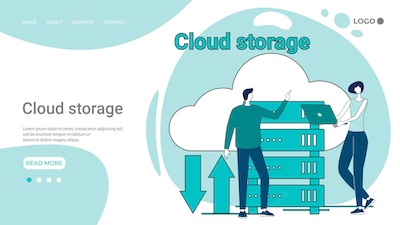 As cloud storage becomes increasingly popular, organizations and individuals are faced with the challenge of choosing the right storage model to meet their needs. Public, private, and hybrid cloud storage options each offer unique advantages and drawbacks, making it essential to understand the differences between them to make the best decision. In this article, we will explore each of these cloud storage models, their key features, and how they can be beneficial for various use cases. By the end of this article, you should have a clear understanding of the differences between public, private, and hybrid cloud storage, enabling you to find the perfect fit for your storage needs.
As cloud storage becomes increasingly popular, organizations and individuals are faced with the challenge of choosing the right storage model to meet their needs. Public, private, and hybrid cloud storage options each offer unique advantages and drawbacks, making it essential to understand the differences between them to make the best decision. In this article, we will explore each of these cloud storage models, their key features, and how they can be beneficial for various use cases. By the end of this article, you should have a clear understanding of the differences between public, private, and hybrid cloud storage, enabling you to find the perfect fit for your storage needs.
Public Cloud Storage: Sharing Resources with the Masses
Public cloud storage refers to a service model where storage infrastructure is owned, managed, and operated by a third-party provider. In this model, users share storage resources with other clients of the provider. This shared approach offers several key benefits:
-
Cost-effectiveness: With public cloud storage, users pay only for the storage space they use, making it a more affordable option compared to private cloud storage, which requires dedicated infrastructure. Additionally, public cloud providers often offer a variety of plans to suit different budgets and storage needs.
-
Scalability: Public cloud storage offers virtually unlimited storage capacity, allowing users to easily scale their storage space up or down as needed without the need for additional hardware.
-
Ease of use: Public cloud storage providers typically offer user-friendly interfaces and tools that make it easy for beginners to manage their files and folders.
However, public cloud storage also has some drawbacks, primarily related to security and control. Since the storage infrastructure is shared among multiple users, public cloud storage may not be suitable for organizations with strict security or compliance requirements.
Private Cloud Storage: A Dedicated Solution for Your Organization
Private cloud storage is a storage model where the infrastructure is dedicated to a single organization. This can either be owned and managed by the organization itself or hosted by a third-party provider on behalf of the organization. Some of the key benefits of private cloud storage include:
-
Enhanced security: Private cloud storage offers a higher level of security compared to public cloud storage, as the infrastructure is not shared with other users. This makes it ideal for organizations that handle sensitive data or have strict security and compliance requirements.
-
Greater control: With private cloud storage, organizations have more control over their storage environment, including the ability to customize storage policies, access controls, and other settings to meet their unique needs.
-
Improved performance: Private cloud storage can provide better performance compared to public cloud storage, as resources are not shared with other users. This can be particularly beneficial for organizations with high-performance storage requirements.
The primary downside of private cloud storage is the cost, as it requires dedicated infrastructure and management resources. Additionally, private cloud storage may not offer the same level of scalability as public cloud storage, depending on the organization's infrastructure.
Hybrid Cloud Storage: The Best of Both Worlds
Hybrid cloud storage combines the advantages of both public and private cloud storage models. In this approach, an organization can store sensitive data on a private cloud while using public cloud storage for less sensitive information or for additional capacity. Some of the key benefits of hybrid cloud storage include:
-
Flexibility: Hybrid cloud storage offers organizations the flexibility to choose the best storage model for each type of data, based on factors such as security, cost, and performance.
-
Cost savings: By utilizing the cost-effective public cloud storage for non-sensitive data, organizations can reduce their overall storage costs while still maintaining the security and control provided by private cloud storage.
-
Scalability: Hybrid cloud storage allows organizations to take advantage of the scalability offered by public cloud storage while maintaining the security and performance of private cloud storage for sensitive data and critical applications.
-
Disaster recovery: Hybrid cloud storage can be a useful component of a disaster recovery strategy, as data stored in the public cloud can be easily replicated and accessed in the event of an on-premises infrastructure failure.
Despite these benefits, hybrid cloud storage can also present some challenges, such as increased complexity in managing multiple storage environments and potential data transfer costs between public and private clouds.
How to Choose the Right Cloud Storage Model
When deciding which cloud storage model is the best fit for your organization or individual needs, consider the following factors:
-
Security and compliance: If you have strict security requirements or need to comply with industry-specific regulations, private cloud storage may be the best option. However, if your security needs are more flexible, public or hybrid cloud storage may be more suitable.
-
Budget: Public cloud storage is typically more cost-effective than private cloud storage, making it a better option for users with budget constraints. Hybrid cloud storage can offer a balance between cost and security, allowing you to optimize your storage strategy based on your budget.
-
Performance: If your storage needs demand high performance, such as for video editing or large-scale data processing, private or hybrid cloud storage may provide the best results.
-
Scalability: Public cloud storage offers virtually unlimited scalability, making it an ideal choice for organizations or individuals with fluctuating storage needs. However, if you require the security and control of private cloud storage, a hybrid approach may be the best solution.
-
Integration: Consider how easily the cloud storage model will integrate with your existing systems and workflows. A hybrid cloud storage solution may require more complex integration and management, but it can also offer the greatest flexibility in meeting your unique requirements.
Conclusion
Choosing the right cloud storage model is crucial in ensuring that your data is stored securely, efficiently, and cost-effectively. By understanding the differences between public, private, and hybrid cloud storage, you can make a more informed decision about which model is the best fit for your organization or individual needs. Each model offers unique advantages and drawbacks, and the perfect fit will depend on factors such as security, budget, performance, scalability, and integration. Ultimately, the key to finding the perfect cloud storage solution is to carefully assess your requirements and weigh the pros and cons of each model in the context of your specific needs.














